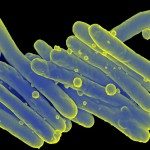Lien vers Pubmed [PMID] – 21768364
Lien DOI – 10.1073/pnas.1016496108
Proc. Natl. Acad. Sci. U.S.A. 2011 Aug; 108(31): 12833-8
Mycolactone is a macrolide produced by Mycobacterium ulcerans with immunomodulatory properties. Here, we describe that in mouse, mycolactone injection led to a massive T-cell depletion in peripheral lymph nodes (PLNs) that was associated with defective expression of L-selectin (CD62-L). Importantly, preexposure to mycolactone impaired the capacity of T cells to reach PLNs after adoptive transfer, respond to chemotactic signals, and expand upon antigenic stimulation in vivo. We found that mycolactone-induced suppression of CD62-L expression by human primary T cells was induced rapidly at both the mRNA and protein levels and correlated with the reduced expression of one miRNA: let-7b. Notably, silencing of let-7b was sufficient to inhibit CD62-L gene expression. Conversely, its overexpression tended to up-regulate CD62-L and counteract the effects of mycolactone. Our results identify T-cell homing as a biological process targeted by mycolactone. Moreover, they reveal a mechanism of control of CD62-L expression involving the miRNA let-7b.







